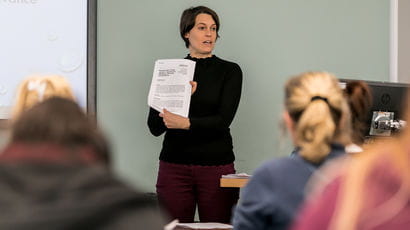Research degree awards
The different postgraduate research awards available and the qualification descriptors they align to.
Regulations
The relevant regulations are E1, E2, E3 and E4.
Regulations can be viewed in full in the Academic regulations 2025/26 (PDF).
Procedures about qualification descriptors and types of research study
Qualification descriptors
- The Doctoral award at UWE Bristol requires candidates to demonstrate that they:
- have conducted enquiry leading to the creation and interpretation of new knowledge through original research or other advanced scholarship, shown by satisfying scholarly review by accomplished and recognised scholars in the field
- can demonstrate a critical understanding of the current state of knowledge in that field of theory and/or practice
- show the ability to conceptualise, design and implement a project for the generation of new knowledge at the forefront of the discipline or field of practice, including the capacity to adjust the project design in the light of emergent issues and understandings
- can demonstrate a critical understanding of the methodology of enquiry
- have developed independent judgement of issues and ideas in the field of research and/or practice, and are able to communicate and justify that judgement to appropriate audiences
- can critically reflect on their work and evaluate its strengths and weaknesses, including understanding validation procedures.
- The Master of Philosophy award at UWE Bristol requires candidates to demonstrate that they:
- have engaged in enquiry which makes a contribution to knowledge within their field of study
- can demonstrate a systematic understanding of the current state of knowledge within their field of theory and/or practice
- show the ability to conceptualise, design and implement a project capable of contributing new knowledge close to the forefront of the discipline or field of practice
- can demonstrate a sound understanding of the methodology and techniques of enquiry relevant to the discipline or field of study
- have developed a capacity to form judgements of issues and ideas in the field of research and/or practice and communicate and justify these to relevant audiences
- can critically reflect on their work and evaluate its strengths and weaknesses.
The overall difference between a Doctorate and an MPhil is not one of time or length but rather an issue of depth and sophistication.
Including written research outputs in MPhil or PhD theses
- Written research outputs that can be incorporated into 'the body of work to be assessed' within the written thesis may include:
- scholarly texts, including journal articles
- books or parts of books
- conference articles or working papers
- research reports
- research-informed policy documents
- patents, published or pending
- translations
- case studies of innovative work
- other written material that provides evidence of original research or advanced scholarship in the field of study
- Other research outputs that could inform the written thesis may include:
- artefacts
- devices
- products
- exhibitions
- performances
- compositions
- portfolios
- designs
- software
- digital or visual media
- other material that provides evidence of original research or other advanced scholarship in the field of study
- Research outputs to be incorporated into the body of work to be assessed must be produced during the period of registration but do not have to have been published.
- The option to include research outputs within the body of work to be assessed in the thesis is available for new postgraduate researchers (PGRs) registering on the MPhil or PhD award for the first time on or after 1 October 2019 or for existing PGRs on these awards whose deadline for completing their PR3 progress review falls on or after 1 October 2020. It is not currently available for Professional Doctorate awards.
Creative practice for MPhil or PhD
- Candidates registered on the MPhil or PhD may undertake research in which their own creative work forms a significant part of the intellectual enquiry, and where the creative work is undertaken as part of the registered research programme approved by the designated college committee. The project registration proposal should set out the intended form of submission as described below.
- Candidates may also undertake research in which the principal focus is the preparation of a scholarly edition of the works of others, for example one or more texts, musical or choreographic works, works of fiction, or other original artefacts.
- In both cases:
- Part of the final submission for assessment may comprise examples of original works in addition to the thesis. For example, works of fiction, musical or choreographic works, designs, devices and products, short films, exhibitions of works, installations or other original artefacts, or examples of creative work. Where practical, this should be bound into the thesis.
- Any submitted creative work must be clearly presented in relation to the argument of a thesis written by the candidate and set in its relevant theoretical, historical, critical or design context.
- The final deposition of the thesis to the University research repository must be accompanied by some permanent record (for example electronic recording, photographic record, musical score, or diagrammatic representation) of the creative work.
Professional Doctorates
Professional Doctorate award titles that have been approved by Academic Board and can be found in the Academic Regulations.
Collaboration with external academic institutions
Establishing a relationship with external academic institutions for delivery of programmes of supervised postgraduate research leading to a research degree of the University.
- Any initial enquiry concerning a possible academic relationship of this kind should be referred to the Director of Student and Academic Services, who will manage the application process, working in close collaboration with the Director and the Manager of the Doctoral Academy and relevant UWE Bristol College staff from the outset.
Doctoral Academy Handbook sections

Introduction
Read an introduction to the UWE Bristol Doctoral Academy Handbook.

Research degree awards
The different postgraduate research awards available and the qualification descriptors they align to.

Student registration
The registration process and periods of active study for postgraduate research degrees.

Professional development and training requirements
Professional development and research training requirements for postgraduate researchers.

Supervision
The role and responsibilities of the supervisory team for postgraduate research.

Research project
The confirmation of the research project (CP1) is where arrangements for the start of the project are confirmed.

Research governance
Research governance for postgraduate research degrees, includes ethics, research data management, intellectual property, conduct and assessment offences.

Personal circumstances
Personal circumstances, reasonable adjustments and other support available to postgraduate researchers.

Progression examination: stage one
The progression examination viva and report submission.

Progress review: stages two and three
The progress review, options for evidence of progress and eligibility for the completion period.

Final submission
Requirements for preparing and formatting the final submission for Doctoral or MPhil level research awards.

Examiners
The University’s expectations of postgraduate research degree examiners and Independent Chairs.

Final examination
The final assessment for Doctoral or MPhil level awards by research.

Higher doctorates
The regulations and processes for eligibility, consideration, submission and awarding of higher doctorate awards.
